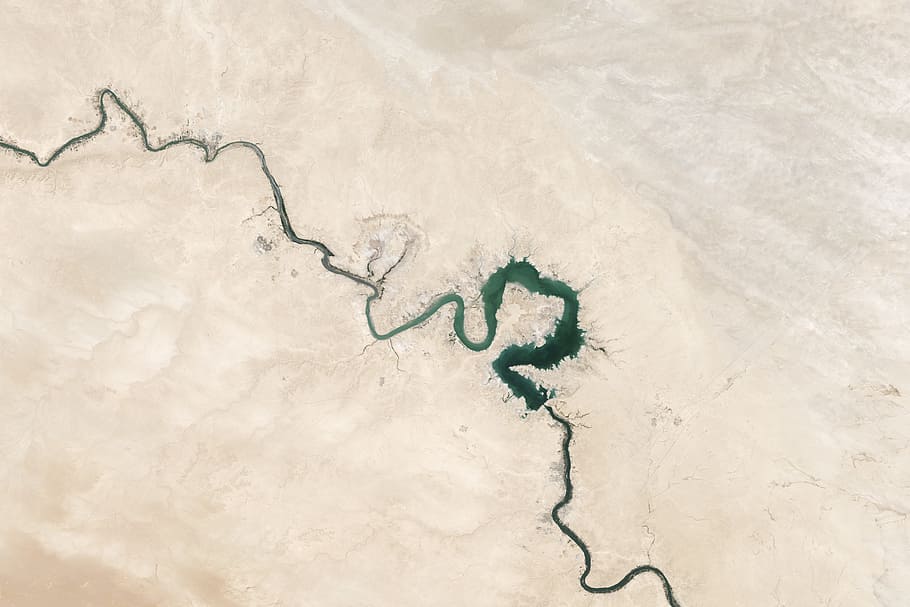The Euphrates River is Running Dry

Image From Creative Commons
The Euphrates River is a major water source in Western Asia. This 1,740 mile long rriver flows through Syria, Turkey and Iraq and serves a population of about 60 million people. Unfortunately, this major water source is drying up due to climate change, causing a disastrous effect on the people who rely on it.
Some believe the river drying up is a prophecy being fulfilled from the Bible, specifically, Revelations, Chapter 16, verse 12 states, “And the sixth angel poured out his vial upon the great river Euphrates; and the water thereof was dried up, that the way of the kings of the east might be prepared.” This verse references the coming of God’s rapture. However, there is also a scientific explanation for this phenomenon.
The average annual flow of the river has decreased to half its original amount. Based on satellite images, the Euphrates River basin has lost 34 cubic miles of freshwater from 2003 to 2013, according to IFL Science.
According to the Inventory of Shared Water Resources in Western Asia states people rely on the Euphrates River for fresh drinking water, irrigation, hydroelectric power and agricultural purposes. The river drying up has threatened the lives of everyday, working people.
Syria and Turkey
In Northeastern Syria, temperatures have risen by 1.8 degrees Fahrenheit compared to 100 years ago and “the average rainfall has decreased by 18 millimeters per month per century,” according to the Center for Strategic and International Studies (CSIS).
Decreased rainfall has also affected Syrian agriculture. Syrian villages have seen a major decrease in crop production, according to the CSIS. Syria’s wheat production has dropped by 75 percent since 2011. Contaminated water and lack of irrigation has also caused farmers to lose their crops.
Syrian and Turkish government policies have not aided in the struggle for water. According to GreenMatters, these government agencies use the need for water as leverage by withholding it from neighboring nations.
The Syrian-Turkish dam along the border is controlled by Turkey. In 1987, Turkey and Syria made an agreement that Syria should get 132,086 gallons of water per second. However, in 2021, Syria accused Turkey of “depriving Syrians of their share of water from the Euphrates.” In reality, Syria was receiving about 52,834 gallons of water per second. This caused the Alouk Water Station in Northeast Syria to stop generating electricity.
Iraq
The Iraqi Ministry of Water Resources estimates that the river will run dry by 2040 “due to declining water levels and droughts driven by climate change”
According to Al Jazeera, an independent news channel in Qatar, the villages in al-Ankour, Iraq are suffering from the decreased access to freshwater. Their only source of water was Habbaniyah Lake. This lake was 55 square miles long and could hold 4.2 billion cubic yards of water. The land where the lake once stood is now cracked and dry.
The people in the villages of al-Ankour, Iraq are relying on bottled water to survive. This is causing families to go into debt from buying water. Instead of fishing in the lake to make a living, workers are having to migrate to the closest cities to find manual labor.
The Civil War in Iraq has severely damaged existing infrastructure and made it even more difficult to build upon it.When ISIS occupied parts of the region, many families were displaced. When these families were able to return, water resources were scarce causing these families to be displaced again, according to Al Jazeera.
Husamk Sobhi, a Baghdad-based environmental activist, believes that Iraq needs a “strong negotiation strategy to improve Iraq’s access to water from neighboring countries.” Many countries in the Middle East do not have a stable government aiding them in their struggle for water. With no strong centralized government, millions of people are not getting the kind of care and support that they need during this environmental crisis.
Health Effects
With the lack of available freshwater, people turned to drinking waters that have later been found to be contaminated. Since people are drinking contaminated water, disease in the Middle East has increased over the past several years. “Diarrhea, chicken pox, measles, typhoid fever, and cholera are currently spreading across Iraq because of the water crisis,” according to the according to the British Medical Journal. The BMJ also estimates that three out of every five children do not have access to “safely managed water services.”
Nonprofit Organizations and Non-Governmental Organizations (NGOs)
Nonprofit organizations have taken it upon themselves to help the people that rely on the freshwater from the Euphrates River. The Peace Forum NGO was started in 2016 by a couple of young activists. Their mission is “to provide water to affected families and advocate for better solutions from local authorities.”
According to the CSIS, other NGOs have come to the aid of the citizens who have minimal access to water. These NGOs help to “monitor the actions of governments
and can be key players in pressing governments to act according to human rights principles.”
In Syria, 15 NGOs have helped by providing retrofitted water stations, 35 have lightly supported water stations, five have helped to provide stations for power supply, 10 have helped provide water trucking filling points, 21 have helped with healthcare facilities and six have helped with providing schools, according to the CSIS.
- Categories: